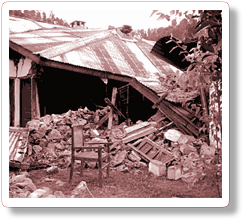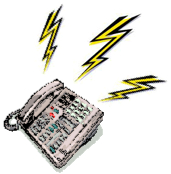|
|
|||||||
NOTE: The Reveille opens in a new window. Vol. 18, No. 27, JANUARY 2, 2006 This Week: Meeting at the Rock Bottom | How to Contact Stefi Baltierra | Rotary Goals in the New Year | District Delivers More Than US$5 Million in Aid to Quake Victims | A Yule Story From Three Weeks Ago | New Year’s Resolutions, Circa 1852 | Web Fun |
||||||||
This Week: Meeting at the Rock Bottom! Rotary Goals in the New Year Commemorating January as Rotary Awareness Month, President Carl’s message was that each Rotarian must become familiar with the organization’s goals. He emphasized the importance of Rotary’s youth programs and that current members be familiar with these successful outreach programs. He stressed the importance of “sharing of information outside of our organization. Rotary is a group of leaders with a superb network. It is time for us to let the world know about all the good things that we have accomplished over so many years. Rotarians have the opportunity to create – and must create – awareness regarding world problems and how they can be solved through cooperation and continuity.” Rotary’s goals for the next ten years deal in the areas of education, drinking water and sanitation. Specifically:
“Through Service Above Self we can all create awareness both internally and externally, thus showing the world the great leadership of Rotary International,” President Stenhammar said. District Delivers More Than US$5 Million in Aid to Quake Victims Districts have contributed more than US$5 million in cash and in kind toward emergency relief to survivors of the deadly 8 October earthquake, according to Pakistan Rotary leaders. More than 120,000 residents of the affected areas are benefiting from the relief and reconstruction initiatives of local Rotarians they say.
“Clubs are providing tremendous assistance to affected people,” says Kidwai, who coordinates the activities of the district’s emergency relief and medical relief committees. “From the first day, Rotarians have been donating [essential] supplies and money, visiting victims, and making sure that relief from clubs and districts here and abroad reaches to those who need it most.” He also notes that support from the Rotary world has been crucial to the success of local Rotarian efforts but more needs to be done to help over five million destitute and homeless quake victims, now threatened by a severe winter. So far, District 3270 has coordinated the distribution of more than 20,000 blankets, 18,000 winterized tents, 12,000 sleeping bags, 2,000 Shelter Boxes, crutches, food, medicine, medical equipment, wheelchairs, warm clothing, and children’s toys. Much of this aid was delivered in partnership with the Pakistan armed forces and humanitarian organizations. Medical volunteers from British and Pakistan Rotary and Rotaract clubs have helped establish and staff field hospitals to serve survivors in key administrative districts and towns such as Mansera, Muzaffarabad, and Rawalpindi. Orthopedic surgeons have treated hundreds of patients injured during the earthquake. According to Azmarai Khan, of the Rotary Club of Abbottabad, who has been coordinating relief efforts in Northwest Frontier Province, the current focus of Rotary and other humanitarian relief organizations is the protection of survivors from severe winter weather. The next phase, rehabilitation and reconstruction, will be key to the restoration of normalcy in the quake-devastated areas, he says. “Rotary can play a very important and helpful role in this phase,” notes Khan. “The only thing is that we need a focused and clear game plan for the successful completion of this phase.” District 3270 is already gradually shifting into reconstruction gear, according to Kidwai. In the coming weeks, the district, UNICEF, and World Health Organization will publish a plan of action including a list of essential projects. Those initiatives will address concerns outlined at a recent donors conference convened by Pakistan President Pervez Musharraf. S will be even more critical to the success of the next phase, according to Kidwai. For more details or to respond to the South Asia earthquake disaster, go to R or visit R, which features regular updates on relief efforts there as well as how Rotarians can help. A Yule Story From Three Weeks Ago "We have to let them know we care," Vivian told Bennett. So they organized a trip to bring soldiers from Walter Reed Army Medical Center and Bethesda Naval Hospital to the annual Army-Navy football game in Philly, on Dec. 3. The cool part is, they created their own train line to do it. Yes, there are people in this country who actually own real trains. Bennett Levin - native Philly guy, self-made millionaire and irascible former L&I commish - is one of them. He has three luxury rail cars. Think mahogany paneling, plush seating and white-linen dining areas. He also has two locomotives, which he stores at his Juniata Park train yard. One car, the elegant Pennsylvania, carried John F. Kennedy to the Army-Navy game in 1961 And '62. Later, it carried his brother Bobby's body to D.C. for burial. "That's a lot of history for one car," says Bennett. He and Vivian wanted to revive a tradition that endured from 1936 to 1975, during which trains carried Army-Navy spectators from around the country directly to the stadium where the annual game is played. The Levins could think of no better passengers to reinstate the ceremonial ride than the wounded men and women recovering at Walter Reed in D.C. and Bethesda, in Maryland. "We wanted to give them a first-class experience," says Bennett. "Gourmet meals on board, private transportation from the train to the stadium, perfect seats - real hero treatment." Through the Army War College Foundation, of which he is a trustee, Bennett met with Walter Reed's commanding general, who loved the idea. But Bennett had some ground rules first, all designed to keep the focus on the troops alone: No press on the trip, lest the soldiers' day of pampering devolve into a media circus. No politicians either, because, says Bennett, "I didn't want some idiot making this trip into a campaign photo op." And no Pentagon suits on board, otherwise the soldiers would be too busy saluting superiors to relax. The general agreed to the conditions, and Bennett realized he had a problem on his hands. "I had to actually make this thing happen," he laughs. Over the next months, he recruited owners of 15 other sumptuous rail cars from around the country - these people tend to know each other - into lending their vehicles for the day. The name of their temporary train? The Liberty Limited. Amtrak volunteered to transport the cars to D.C. - where they'd be coupled together for the round-trip ride to Philly - then back to their owners later. Conrail offered to service the Liberty while it was in Philly. And SEPTA drivers would bus the disabled soldiers 200 yards from the train to Lincoln Financial Field, for the game. A benefactor from the War College ponied up 100 seats to the game - on the 50-yard line - and lunch in a hospitality suite. And corporate donors filled, for free and without asking for publicity, goodie bags for attendees: From Woolrich, stadium blankets. From Wal-Mart, digital cameras. From Nikon, field glasses. From GEAR, down jackets. There was booty not just for the soldiers, but for their guests, too, since each was allowed to bring a friend or family member. The Marines, though, declined the offer. "They voted not to take guests with them, so they could take more Marines," says Levin, choking up at the memory. Bennett's an emotional guy, so he was worried about how he'd react to meeting the 88 troops and guests at D.C.'s Union Station, where the trip originated. Some GIs were missing limbs. Others were wheelchair-bound or accompanied by medical personnel for the day. "They made it easy to be with them," he says. "They were all smiles on the ride to Philly. Not an ounce of self-pity from any of them. They're so full of life and determination." At the stadium, the troops reveled in the game, recalls Bennett. Not even Army's lopsided loss to Navy could deflate the group's rollicking mood. Afterward, it was back to the train and yet another gourmet meal - heroes get hungry, says Levin - before returning to Walter Reed and Bethesda. "The day was spectacular," says Levin. "It was all about these kids. It was awesome to be part of it." The most poignant moment for the Levins was when 11 Marines hugged them goodbye, then sang them the Marine Hymn on the platform at Union Station. "One of the guys was blind, but he said, 'I can't see you, but man, you must be f---ing beautiful!'" says Bennett. "I got a lump so big in my throat, I couldn't even answer him." It's been three weeks, but the Levins and their guests are still feeling the day's love. "My Christmas came early," says Levin, who is Jewish and who loves the Christmas season. "I can't describe the feeling in the air." Maybe it was hope. As one guest wrote in a thank-you note to Bennett and Vivian, "The fond memories generated last Saturday will sustain us all - whatever the future may bring." God bless the Levins. And bless the troops, every one. New Year’s Resolutions, Circa 1852 SCHOOL ANSWERING MACHINE
The school and teachers are being sued by parents who want their children’s failing grades changed to passing grades even though those children were absent 15-30 times during the semester and did not complete enough school work to pass their classes. This is the actual answering machine message for the school:
|


 Mike Ralph, who is involved with Stefi’s contact with Rotarians, has recommended direct contact with Stefi to get on her calendar. She is comfortable taking calls from Rotarians and figuring out whether her schedule will allow her to participate. You can
Mike Ralph, who is involved with Stefi’s contact with Rotarians, has recommended direct contact with Stefi to get on her calendar. She is comfortable taking calls from Rotarians and figuring out whether her schedule will allow her to participate. You can  The holiday is over! And, the BBRC returns to after-holiday normalcy with the first meeting of 2006. This Friday, the club will gather at ROCK BOTTOM, in the center of downtown Bellevue, for breakfast and a program on brewing beer by the Rock Bottom’s Brewmaster. Remember: Glendale is closed this week! That’s why we’re meeting elsewhere. Gather at Rock Bottom at 7:00 a.m. and we’ll have a great time! Parking available in the Galleria parking garage underground.
The holiday is over! And, the BBRC returns to after-holiday normalcy with the first meeting of 2006. This Friday, the club will gather at ROCK BOTTOM, in the center of downtown Bellevue, for breakfast and a program on brewing beer by the Rock Bottom’s Brewmaster. Remember: Glendale is closed this week! That’s why we’re meeting elsewhere. Gather at Rock Bottom at 7:00 a.m. and we’ll have a great time! Parking available in the Galleria parking garage underground. According to Rotary International District 3270 Governor Mohamed Faiz Kidwai, nearly every one of Pakistan’s more than 3,000 Rotarians and Rotaractors responded quickly to the plight of residents of Pakistan-administered Kashmir and Northwest Frontier Province, which together sustained close to 100,000 deaths and many more injuries.
According to Rotary International District 3270 Governor Mohamed Faiz Kidwai, nearly every one of Pakistan’s more than 3,000 Rotarians and Rotaractors responded quickly to the plight of residents of Pakistan-administered Kashmir and Northwest Frontier Province, which together sustained close to 100,000 deaths and many more injuries.  It started last Christmas, when Bennett and Vivian Levin were overwhelmed by sadness while
It started last Christmas, when Bennett and Vivian Levin were overwhelmed by sadness while  This is the message that the Pacific Palisades High School (California) Staff voted unanimously to record on their school telephone answering machine. This came about because they implemented a policy requiring students and parents to be responsible for their children’s absences and missing homework.
This is the message that the Pacific Palisades High School (California) Staff voted unanimously to record on their school telephone answering machine. This came about because they implemented a policy requiring students and parents to be responsible for their children’s absences and missing homework.